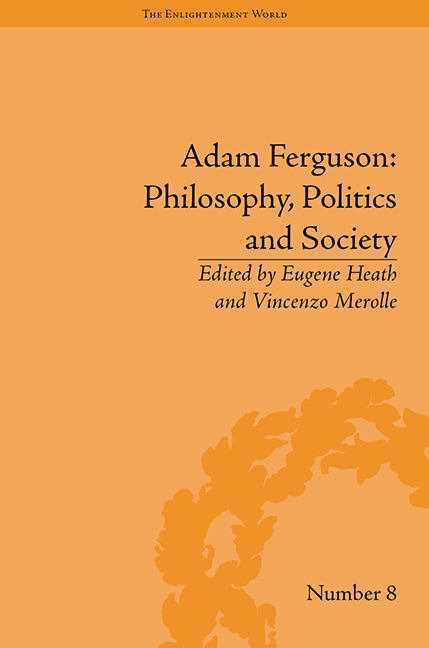9 - Ferguson and the Unintended Emergence of Social Order
from IV - Society
Summary
In the title of an essay published just over four decades ago, F. A. Hayek abridged the words of Adam Ferguson to epitomize the idea that there are beneficial social outcomes that are neither the immediate result of nature nor the artificial product of a designing mind. The words employed – the results of human action but not of human design – are drawn from a section of Ferguson's work, An Essay on the History of Civil Society, in which he elaborates on how structures of society, including institutions and forms of government, derive not from the speculations and reason of individuals or from the foresight of some great legislator but from the actions of individuals.
Every step and every movement of the multitude, even in what are termed enlightened ages, are made with equal blindness to the future; and nations stumble upon establishments, which are indeed the result of human action, but not the execution of any human design.
Ferguson's remarkable précis suggests a striking and powerful idea. It may seem paradoxical, therefore, that at the close of the sentence he appends a citation to the Memoirs of Cardinal De Retz, a man so influenced by Niccolò Machiavelli that he believed that great men could influence the course of history! Of course, in a strict sense Ferguson's statement does not preclude such a possibility. In any case, however, the idea of this passage is not unique to Ferguson, for it is explored in varying degrees and contexts by other thinkers of the eighteenth century, including Bernard Mandeville, David Hume and Adam Smith. Nonetheless, it is Ferguson who, more than his friends Hume or Smith, seems intrigued by the idea.
Scholars have long noted how some thinkers of the eighteenth century use or allude to the concept of unintended emergence. Before Hayek, Gladys Bryson pointed out how one of Ferguson's most salient ideas was that of the growth of culture over time.
- Type
- Chapter
- Information
- Adam FergusonPhilosophy, Politics and Society, pp. 155 - 168Publisher: Pickering & ChattoFirst published in: 2014



